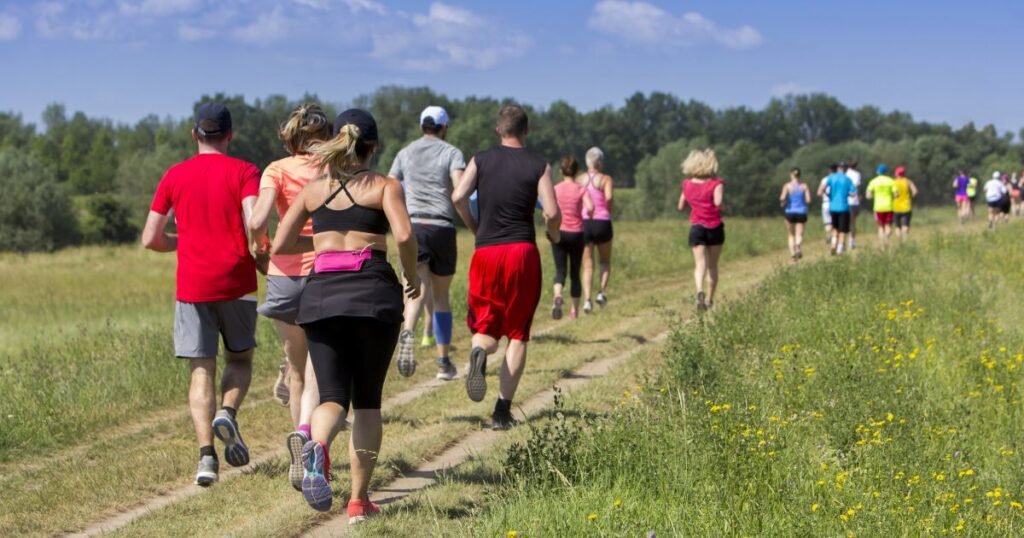With over 450,000 high school students competing nationwide, cross country racing continues growing in popularity as one of America’s most accessible and rewarding sports. I remember the proud exhaustion from pushing my body to the limit through fields, trails, and hills when I ran cross country in school. While the sport builds tremendous physical fitness, the lesser-discussed mental and emotional benefits can be even more valuable over the long term.
I will highlight the impressive benefits of cross country running. From lifelong healthy habits to self-confidence, patience, and a connection with nature, cross country enhances lives far beyond the race course. The unique camaraderie and values of this tight-knit community shape well-rounded athletes. Whether you are considering cross country yourself or know someone who could use the encouragement, read on to learn all about the fitness, focus, freedom, and fun that makes cross country running so enriching.
11 Benefits of Cross Country Running
Improved Cardiovascular Health
One of the main benefits of cross country running is substantial improvement in cardiovascular health. As an aerobic activity, running long distances requires the strengthened and efficient function of the heart and lungs to circulate oxygenated blood to working muscles continually.
The heart adapts to the demands of transporting blood and nutrients by expanding ventricular volume. This allows more blood to pump with each contraction, increasing stroke volume. These cardiovascular adaptations enable the heart to pump much higher quantities of blood with less effort. Vital signs like resting heart rate and blood pressure decrease significantly.
This results in much-improved oxygen delivery during routine daily motions. So beyond allowing better running itself, the cardiovascular benefits of cross country running serve lifelong health. Aerobic conditioning protects against heart conditions and helps maintain healthy blood pressure levels even into older age. So, lacing up your cross country flats is pivotal in sustained cardiovascular wellness.
Enhanced Respiratory Function
The continuous aerobic activity of cross country also greatly enhances respiratory function over time. As runners challenge their cardiovascular systems, the corresponding demands on the lungs trigger adaptational changes. The diaphragm and intercostal muscles that control breathing strengthen to expand lung capacity.
Running’s conditioning forces increased concentrations of vital red blood cells and myoglobin that transport oxygen. All these enhancements combine to raise ventilation capacity drastically. After consistent training, a runner’s lungs can uptake exponentially larger amounts of oxygen when demand rises.
So beyond improving running itself, boosted lung function from cross country running promotes easier daily breathing and healthier resistance to illness. Running leaves cross country athletes with breath to spare as their hearts and lungs become more efficient.

Strengthened Bones and Muscles
The continuous impact forces generated from running long distances also promote increased bone mineral density over time. This happens because cross country running repeatedly loads skeletal structures, signaling for added calcium deposition.
This reduces the risk of developing osteopenia and osteoporosis later in life. So beyond allowing better running now, improved bone density from high school and college cross country running protects lifelong skeletal health.
Additionally, muscle cells regenerate and grow larger from the microtears induced by running long distances. So, over months of training, cross country runners build noticeably more muscle mass throughout the glutes, quadriceps, calves, and core.
Increased Endurance and Stamina
The fundamental nature of cross country running involves completing long-distance races up to 5K for high school and 10K for college athletes. Performing weeks and months of high-mileage training inevitably develops incredible cardiovascular and muscular endurance.
Race pacing competence also becomes intuitive. As difficult as intense runs may feel initially, the body learns how to speed up efficiently without rapid fatigue. Race strategy skills also transfer to pacing for success when facing other intense endeavors in academics, career, or even financial goals later in life.
The mental tenacity built from pushing through discomfort during challenging workouts pays dividends. On physical merits, boosted stamina from cross country training allows participation in new activities. I like hiking mountain trails and joining recreational team sports. At the same time, cross country itself provides plenty of excitement.
Weight Management
On top of the host of physiological benefits, the sheer exercise volume from consistent cross country training inevitably results in easier weight management. At its core, successfully losing or maintaining body fat comes down to a sustained caloric deficit. Running 5-7 days per week over hilly terrain while monitoring nutrition makes keeping off excess weight a simple science.
Even just 30-45 minutes of steady jogging can burn 300+ calories. So, the thousands of calories burned weekly from months of higher mileage training add up exponentially. Adding in complementary core and strength training leads to even better body composition. The boosts in metabolism and hunger regulation from intensive cardio exercise give cross country runners an automatic advantage in achieving fitness goals.

Stress Relief and Mental Wellbeing
While the physical results of training stand out, the mental benefits of the cross country maybe even more valuable. The sport constitutes more a lifestyle than a direct competition or skill development. Routinely running alone through nature undeniably produces powerfully therapeutic emotional effects over time.
Pushing your mental willpower during challenging runs builds tremendous confidence that you can persevere through other difficulties beyond running. Cross country runners soon grow confident in facing discomfort or uncertainty. Racing itself also teaches courage, focus, and patience. All these mental skills gained through cross country running enable a better life perspective and consciousness.
Boosted Immunity
While excess intensity can temporarily suppress immune function, research shows routine moderate cardio exercise consistently enhances immune cell circulation. This stems largely from heightened blood flow and lung capacity, efficiently distributing vital oxygen and nutrients to all tissues. White blood cells also multiply faster in response to temporary spikes in heart rate and body temperature.
Over longer periods, this more active immune surveillance results in quicker detection and defense against foreign pathogens and invasive organisms. So, seasoned cross country runners get sick less often through both prevention and heightened reactivity. Given current health concerns, building resilience through relaxed running is highly important.
Improved Sleep Quality
Between mentally recharging amid nature’s peace and the enhanced melatonin signaling from regular activity, running intrinsically improves sleep cycles. Settling into deep REM sleep becomes easier with better circulation and body awareness.
Running also expends energy, which makes the body crave rich rest and recovery overnight. The sense of accomplishment from completing daily mileage permits the mind to detach from conscious thought patterns that can delay falling asleep.
Cross country runners learn to wake up feeling refreshed as sleep quality and vitality improve. Making it through that early morning shakeout run before class becomes less chore. In many ways, the lifestyle demands and benefits of cross country running interplay to make adequate rest a near guarantee.

Enhanced Self-Esteem and Confidence
Running high mileage over months instills an acute sense of individual capability and self-reliance. The discipline to wake up early for miles or push through intense sessions demonstrates personal drive. This transfers into positive self-regard, as progress toward race validates competence and work ethic.
Even through low moments battling doubt, breakthroughs, where work pays off boost pride and confirmation. Progressing season best times, moving up varsity race placements, or qualifying for prominent invitational meets provides tangible self-esteem lifts. Accomplishing incremental goals demonstrates full potential is never quite known – there is always room for growth.
The exhilaration of competing head-to-head also builds ownership of abilities. Handling adversity during races – whether going out too fast early or rallying from behind – calls for resilience. Cross country running challenges teach healthy mindsets to acknowledge but isolate negative self-talk. Each success, no matter how small, marks another confidence marker. This empowers runners to recognize their best selves.
Stronger Team Spirit and Camaraderie
On the social level, cross country running inherently bonds teammates together with a familial spirit. Managing long run distances on practice courses, battling nerves pre-race, and sharing victory sweats create connection. Pushing each other through workouts week after week forms trust and interdependency. More experienced varsity runners feel accountable for mentoring new runners. Younger runners feel welcomed into something larger than themselves. Shared adversity and triumph build camaraderie.
The widespread tradition of campouts, pasta feeds, and signature chants/cheers generates a storied identity and legacy unique to each program. Committing together toward team scoring combines individual development with a collective goal. Lifelong memories and relationships naturally develop. This cross country family” support system benefits school studies and home life beyond graduation.
Appreciation for Nature and the Outdoors
A final intangible benefit of cross country is cultivating reverence for environmental preservation through outdoor running. Courses wind through community green spaces, forests, wetlands, and highways. Exploring diverse landscapes fosters curiosity and care for these public spaces. As running relies solely on nature’s raw provision, self-propelled motion sparks reflection about where sustenance and renewal originate. Being active participants outdoors – as opposed to detached digital consumers – imprints stewardship.
Running promotes sustainability habits, like hydrating with water and consuming natural fuel via whole foods. Escaping synthetic confines to embrace simple movement, organic curvature, and fresh air – the building blocks of vitality – grounds values. Cross country running immerses vulnerable humanity within nature’s overwhelming scale and reassuring refuge. Getting lost in adventuring makes life feel worth exploring again. Creative liberty flows as the mind detaches from draining trivialities inside artificial walls.

Conclusion
After analyzing the range of fitness, health, social, and mental impacts, cross country running enhances well-being in myriad interrelated dimensions. Boosts in areas like cardiovascular capacity, immunity, and confidence compound over months of training to elevate full lifestyle vitality.
Beyond physical performance, lifelong lessons about tenacity, camaraderie, and connection to nature establish a mature perspective. The accessibility and inclusiveness of running opens life-shaping transformation to all willing to embrace discomfort in search of self-realization. Anyone questioning their potential can find empowering actualization along the dirt paths, grassy fields, and community trails cross country running reveals.
FAQs
Is Cross Country Running Safe for Beginners?
Yes, the gradual training buildup enables runners of all levels to adapt based on current capability. Coaches prescribe workouts catered specifically to experience.
Do I Need Expensive Gear to Start cross Country?
No, basic running shoes and everyday athletic attire will suffice initially as fitness improves. Minor investments might include socks, shorts, jerseys etc.
Can Walking Portions ever be Acceptable on Practice Runs?
Absolutely yes. Cross country aims to sustain aerobic development, so walking uphill and recoveries maintain intended stimulus.
What Surface or Terrain do Cross Country Runners Train On?
Courses include hills, grass, trails and roads to prepare runners for diverse conditions. Surfaces intentionally vary by workout to complement different training goals.
Can Anyone run Cross Country Races or just Students?
Community running events like 5Ks essentially emulate cross country races for recreational runners. However school championship meets require current enrollment.




